Cultural traditions play an important role in preserving the ethnic identity of Kazakhs abroad. Many generations of Kazakhs have passed on the accumulated experience to their descendants, and this regulation is the main way of transmitting the experience “From father to son”. We must not forget that the heritage of the people is a social experience that is passed on to the society as a whole, and the social method of the transmission of experience is called tradition. This method of imparting the experience involves the time-tested facilities necessary for the effective life of society.
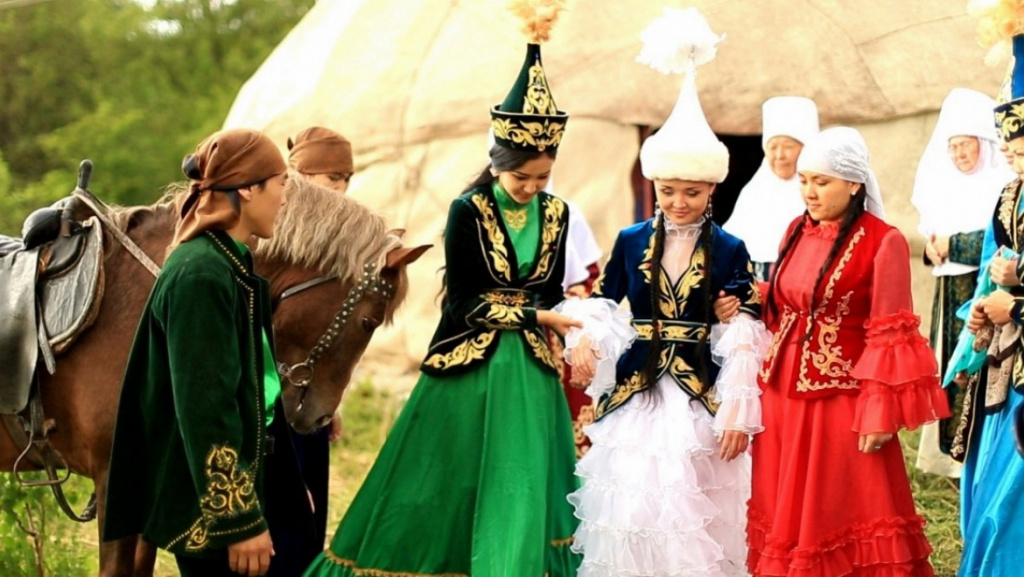
Translating from Latin, the word “Tradition” (traditio) literally means “To give”, that is, to act. In ancient times, it was used to give any material possessions, such as when a daughter was given away or when she gave a certain thing. Later, intangible values were added to material things such as skills and abilities based on experience. Accordingly, traditions mean something that is transmitted in a particular environment (society, group) and does not belong to a particular person.
Heritage is one of the most important regulators of public relations. It is something that is constant, unchanging, connected with the past and does not need to be understood. This formed thing is presented as a set of cultural and social heritage historically.
Traditions are defined as “Something passed down from one generation to another, inherited from previous generations (for example, ideas, attitudes, tastes, actions, customs)”. Customs are “A set of practical and social actions, ideas, procedures, habits and skills that are passed down from generation to generation and act as one of the regulators of social relations”.
The power of traditions lies in the minds of people and does not allow them to act differently, and sometimes even the threat of legal liability does not stop them. It is not difficult to understand the power of Kazakh national traditions such as “Wedding”, “Kudalyk”, “Kyz Uzatu”, because they can not be stopped even in the conditions of sanitary quarantine, and you can see that they have been the subject of news in the media for a year and a half.

In this article, traditions are considered as national cultural traditions, because if we take the general traditions, it is impossible to cover the topic in the context of the article.
In this sense, the researcher E.S. Markaryan gave a definition to the concept of “Cultural tradition” in the Soviet era: “Cultural tradition is a group experience expressed in socially organized stereotypes, through which the spatial-temporal transmission is accumulated and widely reproduced” (author`s translation: сultural tradition is a group experience that is reflected in socially organized stereotypes that are accumulated and reproduced in different human communities through spatial-temporal transmission.).
Giving the value to this definition of “Spatial-temporal transmission”, it contributes to the justification of the experience of the Kazakhs in the preservation of national cultural traditions in a comparative analysis. It tells about the traditions of the Kazakhs living in different countries, different political and economic conditions, and different times.
The purpose of this analysis is to explore the issues of the transformation of Kazakh national traditions in the context of preserving a national identity, their role in preserving the cultural code, the impact of scientific and technological progress, and modern technology on the content of national traditions.
Nowadays, there are many scientific concepts of “Common traditions”, but the following ideas should be highlighted among all the scientific views: first of all, cultural traditions are closely linked to the social reality and they can not remain unchanged over time; secondly, the cultural traditions are not invented by a certain person, so, the traditions are not the product of its own creative ideas, and therefore, they pass on to others.
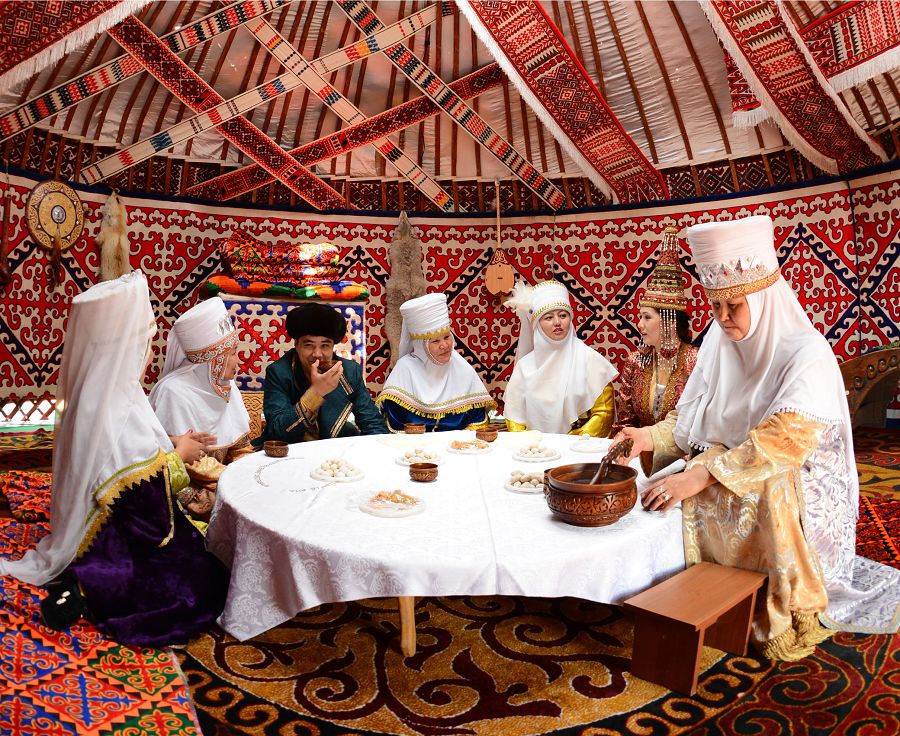
Thus, talking about traditions, the article deals with the traditions itself and other “Traditional” components such as customs, rituals, norms and rules, behavioral habits, tastes, attitudes, images of actions and skills. These components reflect the consciousness of certain people and allow us to identify people by dividing them into “Ourselves” and “Strangers”. One of the types of cultural traditions is folk traditions.
The words “Custom” and “Heritage” are often used as synonyms for the word “Tradition”. Giving the definition to the word “Tradition”, we can say “It has been like this before”, “It has been like this for a long time”, it is like an unwritten law, and it is followed by almost everyone. For example, during the national traditions, Kazakhs always gave gifts to their cousins, and if we take a new style of this tradition today, these gifts have become more expensive in monetary terms, and sometimes there is competition between relatives and in-laws.
The reasons for this change in tradition are, first of all, the economic living conditions of the Kazakhs, the development of technology in various spheres of public life. In particular, there are differences in the organization of weddings of Kazakhs in Mongolia, China, Turkmenistan or Kazakhstan, that is enough to watch videos on the Internet. The difference begins with the names of the gifts and ends with the names of national dishes on the holiday table. While Kazakhs living in rural areas in Mongolia can still use a livestock as gifts, Kazakhs in Turkmenistan value the carpets and jewelry as the gifts.
It should be noted that the cultural traditions of the Kazakhs take into account the values of a particular country and state in which they live. These are unique values that can be seen in everyday life. Kazakhs, regardless of their country of residence, learned the language and culture of the local people and became the worthy citizens of that country.
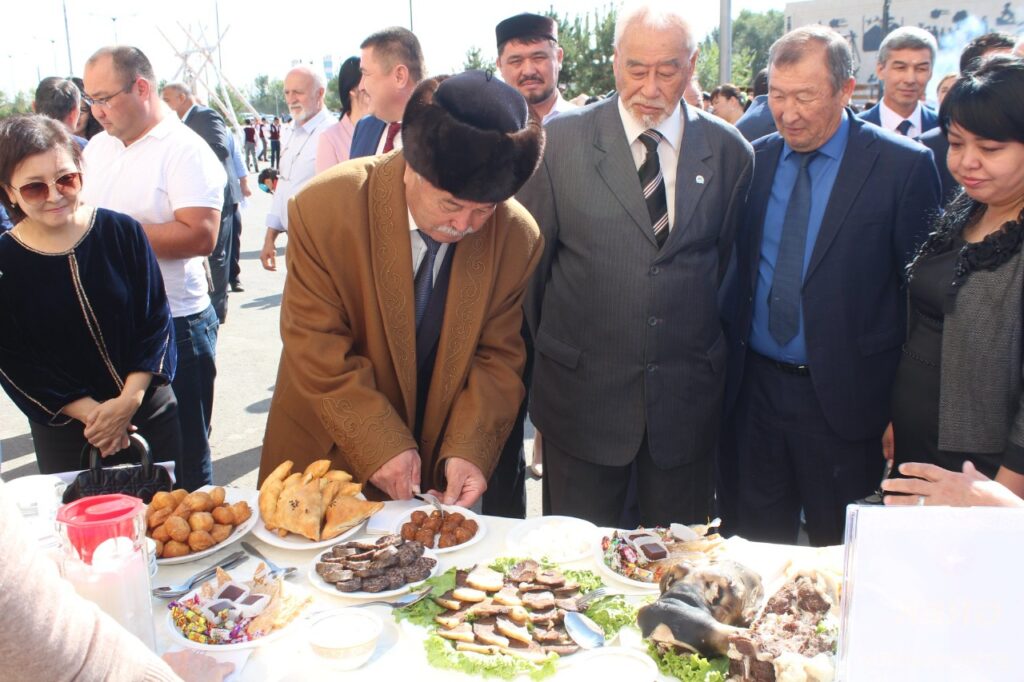
The cultural customs of Kazakhs living in different countries may be completely different. For instance, a situation that is the norm for one Kazakh may seem strange to Kazakhs in another country. For example, in some eastern countries, drinking tea is a special ritual, so the guests should not refuse an invitation to tea, as it can be perceived as disrespectful. And, Kazakhs living in Russia take this situation lightly. There is also a tradition of drinking tea in Russian culture, where it does not seem inappropriate for Kazakhs to refuse to drink tea.
Kazakhs are the indigenous people of the Russian Federation, the tenth largest among all ethnic groups in the country. The largest number of Kazakhs live in the Astrakhan and Orenburg regions of the Russian Federation.
The degree of urbanization also affects the differences in the preservation of national traditions of the Kazakhs. The rural residents pay more attention to traditions related to their mentality than urban Kazakhs, who are involved in public service, entrepreneurship and other employment. For example, the preservation of Kazakh national traditions can be seen in clothing, speech, nutrition, worldview, psychology, and sometimes, religion. It should be noted that all these criteria of differences in the cultural traditions of the Kazakhs are still relevant today. Of course, the gradual elimination of the gap between urban and rural life will have a certain impact on culture and traditions, but making homemade butter and bake the buns with cottage cheese is more common in rural Kazakhs than in urban areas, where you can buy these products in stores.
The same can be said about the Kazakh way of life. To date, many Kazakhs in the Bayan-Ulgei region of Mongolia and the XUAR of China are nomadic, involved in animal husbandry, while ethnic Kazakhs in Turkmenistan's Balkan and Dashoguz provinces are more involved in crop production. This way of life influences the traditions they follow, especially their eating habits.
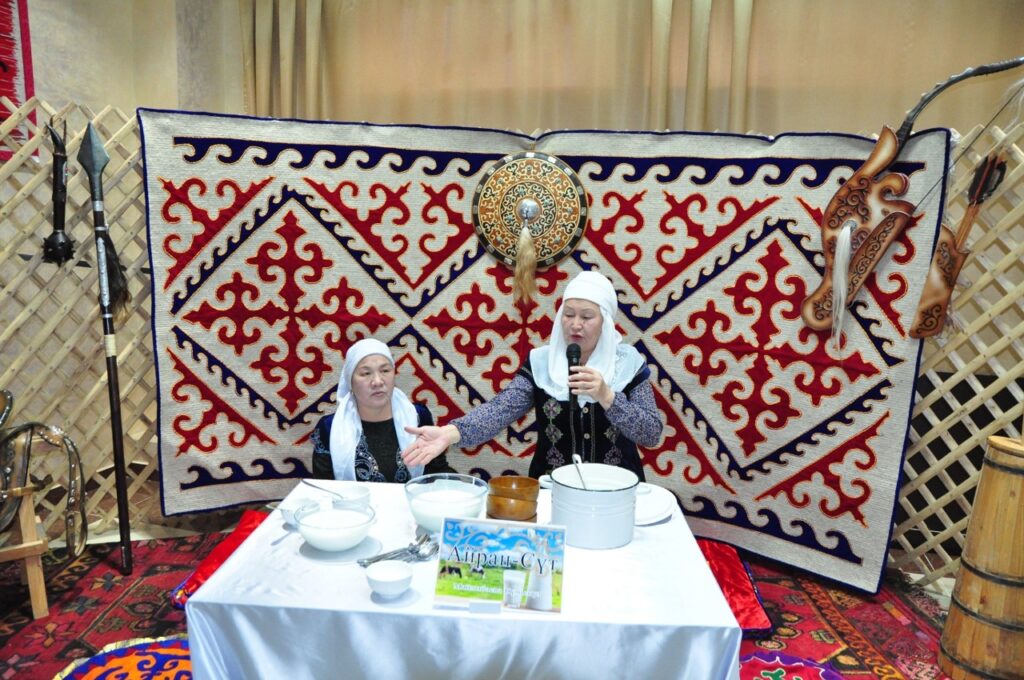
Traditions do not appear by themselves, they appear only when necessary. They can change along with human consciousness and people's interests, they can disappear and then emerge in a new way. A vivid example of such a national cultural tradition of the Kazakhs is the celebration of “Nauryz meiramy”.
The historians do not know the exact date of origin of the holiday, but it is known that it was celebrated by nomads until the VII century B.C. The holiday begins with the traditional dawn. After the morning rituals, the messengers tour all the streets and yards, and invite everyone to celebrate this holiday. A lot of dishes are prepared on these days in order to wish an abundance for next year. In addition, the holiday is associated with fun games, horse races, songs and competitions, that are attended by all people, regardless of age and gender. The main dish of this day is “Nauryz-kozhe”, which consists of seven ingredients, such as water, meat, salt, fat, flour, milk and cereals, that represent the seven elements of life.
Nauryz holiday was not always celebrated in Kazakhstan. Due to the ban by the Soviet authorities, the holiday was not celebrated nationwide from 1926 to 1988. Officially, the holiday was revived by the Decree of the President of the Kazakh SSR as of March 15, 1991, “On the national spring festival – Nauryz”, in accordance to which 22nd of March was declared as a public holiday. In 2001, the holiday was declared as a state holiday, and since 2009 it has been celebrated for three days in a row. In February 2010, the 64th session of the UN General Assembly declared 21st of March as the “International Day of Nauryz”. This means that the historical events in Kazakhstan have had a significant impact on how the modern Kazakhs celebrate Nauryz around the world.
The traditions of the holiday “Nauryz” have been preserved until this day and adapted to the modern life. Nowadays, the theatrical performances, concerts, charity events, folk and sports games are organized during the celebration. However, the feeling of the new year, spring renewal and good wishes - remains unchanged.
Each Kazakh tradition has its own meaning, that is reflected in its functions – the stabilization and development of relations in society by influencing the spiritual world of human through moral norms and rules; ensuring the transmission of cultural and spiritual relations from generation to generation, while maintaining ties between the generations. Let`s take as an example the tradition of celebrating Nauryz in foreign countries. For instance, Kazakhs living in different countries of the world revive the model of communication, their national customs (clothes, national dishes, music, songs, etc.) and pass it on to the next generation.
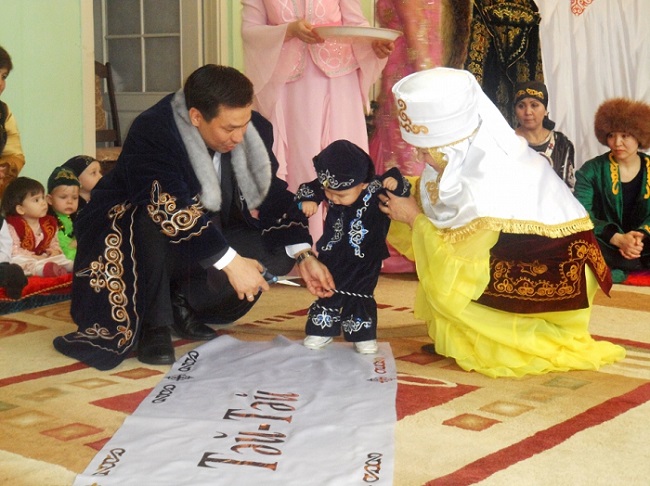
National and cultural roots play an important role in the history of the people. “We must never forget the past and our roots. Also, we must know and respect the deep history of our people. The peculiarities of each nation of the world can be identified through national music, crafts, customs and traditions. By exploring these features, it is possible to understand the principles of life and soul of the people. Traditions and customs form a strong thread that connects generations. The heritage of the past, traditions, customs, language, family, lifestyle and holidays – this is something that reflects the cultural and genetic code of the nation. These are the historical and cultural foundations formed over the centuries”.
“The customs and traditions of the Kazakhs, that have come down from the depths of centuries, are very important for the younger generation. Especially, the respect for the elders, kindness to the younger generation, special respect for the family members and so on are in our genes.
The preservation of national traditions by foreign Kazakhs begins with the use of the native language, as the traditions and their attributes have their own historical names.
The investigation of life of Kazakhs in Mongolia and China has shown how careful Kazakhs are in preserving the national traditions. For example, the Kazakh diaspora in Mongolia is trying to maintain its relationship, and members of the diaspora encourage their children to know the history, culture and customs of their ancestors. Besides that, they require their children to follow Kazakh traditions, know their native language and follow the traditions of the family.
The Kazakhs of Mongolia annually organize the festival “Altyn Burkit” (Golden Eagle), during which they hold exhibitions, music competitions, as well as aitys and terme. The main condition is the use of Kazakh musical instruments only. This situation is aimed at preserving the national traditions and culture of Kazakhs living in Mongolia.
Chinese Kazakhs use the Arabic script more than Mongolian Kazakhs, while Mongolian Kazakhs are speaking the Cyrillic quite better. However, when they speak in Kazakh, their language is not different from the language in Kazakhstan. The older generation of Chinese Kazakhs speak in Kazakh more clear, but young people sometimes confuse Kazakh words with Chinese words when speaking, that is considered as a consequence of assimilation. As a key element of national culture, language is influenced by modern life.
“Kazakhs in Mongolia feel more confident than in China, because it is impossible to predict China's policy toward national minorities over the past five or six years”, said a politician, Dosan Baimolda.
However, the older generation of Chinese Kazakhs is trying to preserve the Kazakh language in marriage, and they also encourage to teach the younger generation their native language. First of all, the preservation of national identity is observed, in the family environment: when children are born, they are called by Kazakh names; when children reach a certain age, they perform various Kazakh national traditions; conduct various family holidays (such as divinity, weddings, funerals, etc.) in keeping with Kazakh traditions; prepare Kazakh national dishes for the holidays.
Moreover, Kazakhs in China and Mongolia need to know the language of the country where they live alongside Kazakh, as it is virtually impossible to study or get a job in schools or universities without knowing the local language.
It should be noted that the objective reality contributes to the change of the Kazakh language, and the current state of life affects the language as well.
Nowadays, Kazakh youth in all countries of the world try to learn two, three or more languages than the older generation, that depends on the economic and technological conditions of modern life. For example, high school children speak three languages in our country. In higher education, the students, undergraduates and doctoral students are required to be trained in at least three languages. This applies not only to our country. These areas of training are international in nature.
Therefore, foreign words, that have become the norm in the modern Kazakh language, will be introduced too. For instance, the words “Computer”, “Smartphone”, “Internet”, “Software”, “Display”, “Online”, etc., that are almost identical in any language. Although we do not include international terms, there are new trends related to the social environment in the content of the Kazakh language today. In our opinion, this is the state of the Kazakh language in the modern world, that is typical for all speakers of the Kazakh language, regardless of the country in which they live. Such an objective influence of modernity on the Kazakh language has to be taken for granted. The purity of the Kazakh language in a professional environment can be preserved only by the linguists, because no literary or other (legal, technical, etc.) text in the Kazakh language is possible without modern new words from abroad.
Let's look at some Kazakh national traditions that determine the ethnic identity of the Kazakhs in the world and the peculiarities of their transformation in the current situation.
Observing the peculiarities of the national traditions preserved by the Kazakhs abroad, we usually compare them with how they are preserved in Kazakhstan. Today, some traditions and customs of the Kazakhs are adapted to the modern conditions, but unfortunately, this is not always for the better. It is a pity to see that the historically established traditions of the Kazakhs, full of beautiful, educational and philosophical significance, have lost their original appearance.
According to the author of the Internet material, for example, nowadays, “Kyz Uzatu” (bride`s wedding) is held with unprecedented actions: “White road” with rose petals, messages, departure of young people until midnight, etc. In the ancient times, the bride was taken away early in the morning by the sunrise – a symbol of a new day and life. The day before, the bride visited all her relatives with the song “Synsu” and said goodbye to them.
In fact, we support this opinion that modern Kazakhs around the world use the services of professional organizers when conducting the weddings and other family celebrations (marriage proposal, kyz uzatu, emasculation, reaching the legal age, anniversaries, etc.). It also introduces various activities, including fantasy in the script, in order to make advertising and revenue. In fact, if the holiday is supported by the owners, no one will forbid it. It should be noted that the organizers of the holidays are mostly young people, who do not pay much attention to the traditional Kazakh national events. The main thing is that they are interesting and the owners of the holiday like it, and the ethnic and educational meaning is ignored here. The spread of these cases gradually becomes a social habit, and then people do not think about how national traditions used to be and what is happening now. Apparently, this is how the transformation of cultural traditions begins.
It is clear that the transformation of historically formed national traditions, Kazakh customs is influenced by modern phenomena and objective reality, that can be seen in the following vivid examples.
Ethnic Kazakhs, who immigrated to Kazakhstan from Mongolia a few years ago as adults, have kept in mind the traditions of their families and villages. Many of them are in close contact with relatives and friends living in Mongolia. In recent years, we have established contacts with our compatriots from Mongolia, who live and work permanently in Kazakhstan, and have given them the opportunity to make a comparative approach to the preservation of national traditions among Kazakhs in general. These examples show how modern life changes the historically established Kazakh national traditions, and most importantly, how valuable and philosophical they used to be!
Perhaps the time has come to create and maintain a special public site (or other electronic source) that contains historically sound information describing Kazakh national traditions, customs, and holidays. It would allow people to read and reproduce the original images of Kazakh traditions. Such information from historians would help to restore the beautiful Kazakh customs.
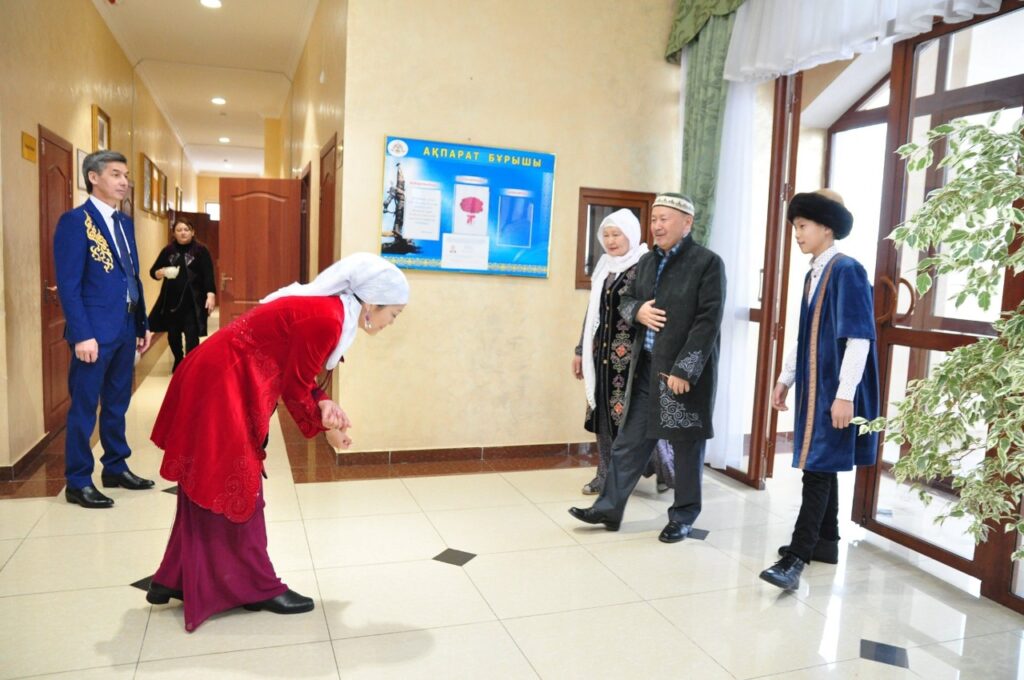
The traditions of the Kazakh people associated with the birth of a child are distinguished by a special solemnity. Many customs, originated in the ancient times, are based on the interaction of tribes at the beginning of the formation of a special structure of steppe society. It reflects the national mythology and mentality of the Kazakh people.
According to Tolek Baidilda and Kasen Tanabai, Kazakh women living in remote villages in Mongolia, often give birth at home for some subjective reasons (inability to get to a medical institution on time, etc.). If a woman gives birth at home or outside the hospital, the person who cuts the baby's umbilical cord is declared a “Mother-in-law”, regardless of whether the person is a woman or a man (“Umbilical-father”).
According to our respondents, this custom has slightly different qualities that they do not support today. It is said that the preservation of these ancient Kazakh customs, especially in Kazakhstan, has often become a formality. For example, when it comes to the “Umbilical cord”, the child's relatives look for a suitable candidate for the child in the future from honorable' relatives or friends, and then this person, usually a woman, is called the “Umbilical cord” does not matter. Our respondents from Mongolia noted that the peculiarity of this custom is the lack of pre-training and selection of the “Umbilical cord”, because anyone who gives a sudden, unexpected, sudden character to this event, should be there when the child is born.
According to the modern requirements, there is no doubt to say, when a child is born in a specialized medical institution, the woman who gave birth cannot be accompanied by anyone other than the medical staff (except for the child's father). This is an objective fact that affects the actual Kazakh customs. Today, it is possible to preserve this tradition in its original form only under certain living conditions, or we need to accept the remnants of this ancient custom.
As for the child's name, Kazakhs in Mongolia give this right to the most honored guest invited to the holiday. In general, Kazakhs usually invite their relatives with many children to the birthday party. The person naming the newborn should not only be a respected person in the family, but also a person with a large family. This person is identified by the guests of the holiday directly during the wedding, so the child's name can be a surprise not only for the parents, but also for the guests of the holiday. This ritual has the value, deep meaning and educational impact of ancient Kazakh customs associated with children. In the current situation, all the wisdom of the Kazakh national traditions, that was built earlier, seems to be disappearing, and we can talk about the influence of time, history, social events and other factors here again.
Let's take another national tradition of Kazakhs living in Mongolia. If the child is not rooted or died for some reason, or the woman is unable to keep the child due to ill health, then a name of any other nationality is given for the woman`s child. Usually, Kazakhs from Bayan-Ulgei region give such a long-awaited child a Mongolian or Russian (Mongolian Kazakhs use Cyrillic, there are also Russians among the permanent residents of the country) or even some negative names. They believe that it will protect the child.
There is another noteworthy aspect. These are the peculiarities of the Kazakh national traditions, depending on the region where the Kazakhs live. For example, Kazakhs living in Berlin (we met them) speak Kazakh with a very strong Turkish accent. Accordingly, during the traditional Kazakh national events, they have elements of Turkish culture that have survived as a result of migration processes. On the contrary, during the meeting with the Kazakhs in Seoul, we noticed that our compatriots are more likely to choose purely Kazakh scenarios for national events, as most Korean Kazakhs came there directly from Kazakhstan.
 Subscribe to our Telegram channel and be the first to know the news!
Subscribe to our Telegram channel and be the first to know the news!
